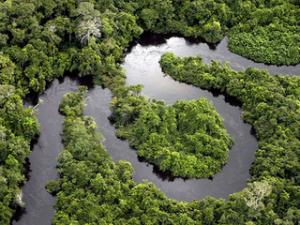 Global efforts to fight the illegal logging trade are paying off, according to a report that found production of illegal timber declining by 22 percent overall since 2002, but with dramatic drops of more than 50% in the Amazon rainforest.
Global efforts to fight the illegal logging trade are paying off, according to a report that found production of illegal timber declining by 22 percent overall since 2002, but with dramatic drops of more than 50% in the Amazon rainforest.
The report, by London’s Chatham House, an independent policy research group, states that the illegal log trade in the last decade has plummeted by 50 percent in Cameroon, by 75 percent in Indonesia, and between 50 and 75 percent in the Brazilian Amazon.
The reduction, documented in three of the five tropical regions studied, has prevented the degradation of up to 65,600 square miles of forest, an area larger than England and Wales combined (17mil. hectare).
Reductions in these three countries may over time help prevent – at relatively low cost – the release of up to 14.6 billion tons of carbon dioxide – the equivalent of half the carbon dioxide released by human actions worldwide each year.
Not only can we measure benefits for the environment but for forest-dependent communities, as well.
Although strict regulations and policies in producer countries remains mostly poor, a number of significant improvements in laws and regulations are now underway as a result of negotiations of Voluntary Partnership Agreements with the EU. Such agreements have already proved effective, according to the report. Further, in 2008, the US became the first country to introduce legislation to make it illegal to handle illegally harvested timber. There are early indications that the new law is already placing pressure on timber producers and processors around the world to police their supply chains.
“The effort to combat illegal logging and improve forest governance has brought developed and developing countries together in a unique way with a shared sense of purpose,” said Lawson. “Our study shows that consumer interest and pressure combined with action by producer countries can yield very positive results.”
The five producer countries studied were Brazil, Indonesia, Cameroon, Malaysia and Ghana.
(Read the full report at the Chatham House website.)
Thanks to Francois langin for submitting the link! – And, Happy Birthday!



















